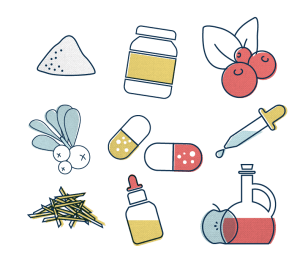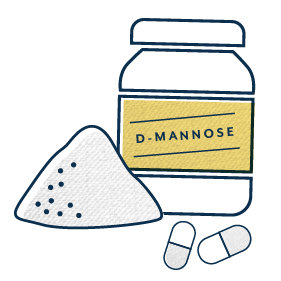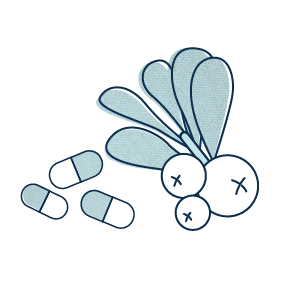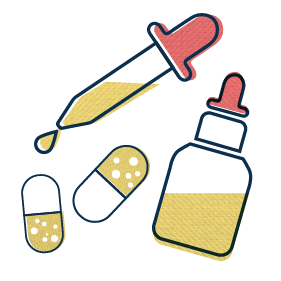UTI Home Remedies: Most Researched vs. Most Searched
If you’ve suffered from frequent UTIs, we’re guessing you’re no stranger to UTI home remedies. In fact, it’s almost impossible to avoid home remedies in a search for recurrent UTI treatment.
Jump To Section:
- The top 10 most searched UTI home remedies >>>>
- D-mannose for UTI >>>>
- Probiotics – oral and suppository >>>>
- Oregano oil, yeast and UTI >>>>
- Vitamin C for UTI >>>>
- Always research UTI natural remedies before you try them >>>>
There Is No Single Natural UTI Remedy That Will Cure All UTIs
While we aren’t about conveying a message of good vs. bad when it comes to UTI treatment, we want to issue the same caution about UTI home remedies that we have for UTI antibiotics…
There is no single natural UTI remedy that will cure all UTIs.
The cause of your recurrent UTI is very unlikely to be the cause of the next person’s recurrent UTI. And the only way you can discover the cause of your UTIs is to seek accurate testing.
Only when you know what’s causing your UTIs, can you begin to look for the right treatment.
Don’t cherry pick UTI home remedies from forums just because an online stranger sounds very convincing.
Don’t find someone whose story sounds similar to yours and commit to the natural UTI remedy they swear by.
And think about this: If their UTI remedy works “every time” they get a UTI, but the UTIs keep coming back, there’s a good chance the remedy isn’t working. It may be relieving their symptoms, but it’s probably not addressing the chronic infection that’s causing their symptoms to return over and over again.
The goal of any UTI treatment should be to clear an underlying urinary tract infection permanently, not temporarily.
What Do We Know About UTI Home Remedies?
Unfortunately, there is a very real lack of studies around natural remedies for urinary tract infections.
Even those remedies that everyone has heard of struggle to be backed by credible evidence.
We just don’t know how most natural UTI remedies work or if they really work at all.
If you’ve ever wondered why doctors don’t often recommend natural remedies. This is the answer…
Without solid evidence, they can’t. Natural remedies are not included in evidence based treatment guidelines, because there isn’t enough evidence yet. So doctors not only don’t know if natural UTI remedies work, they also have no guidance on how you should take them.
It’s really important to note here…
Just because we don’t know IF many UTI home remedies work, it doesn’t mean they don’t work.
We’ve written an entire ebook about how to separate myths from facts when it comes to finding quality supplements and other natural products. Download this ebook for free when you register for product updates.
Consider This Before You Try A Home Remedy
Not knowing if or how something works comes with a set of problems you shouldn’t ignore:
- Plants are made up of chemicals, just like everything else. Without studies to test these chemicals, we don’t know if they are safe short term or long term.
- We often don’t know which organisms natural UTI remedies are effective against, if any.
- We may not know how much to take, how often you should take it, or how long you need to take it for the best results.
- The products are not standardized. How do you know if the particular product you buy is strong, or weak, or high or low quality? How do you even know it’s the product it says it is?
Studies into natural remedies is an area that requires urgent attention. We need answers to these questions.
There is plenty of evidence that some herbal compounds can be as or more effective than antibiotics in certain cases, but we don’t know if they work the same way on pathogens in the urinary tract.
If you use UTI home remedies, or are considering trying something, it pays to do a little research so you can make a more informed decision about what you’re putting into your body.
Although studies are lacking, you can often find helpful information online if you look in the right places. We’ll provide a few tips on what to look for below. But first, let us do some of the work for you.
You can also learn more about non-antibiotic UTI remedies that may help, in our expert video series.
The 10 Most Searched UTI Home Remedies
So, we realize you’re probably used to seeing post after post about the top UTI home remedies.
That’s not what we’re about. I mean, the whole introduction was about how little evidence there is around most UTI home remedies, so recommending specific treatments would be kind of hypocritical.
Instead of pushing a list of remedies to try, we took a look at what people are searching for. We figured it would be more useful to find the ten most searched for UTI home remedies, then provide an overview of the evidence for each.
Just to clarify, when we say UTI home remedies, we are referring to any remedy you can self-administer without a prescription. This might be an over-the-counter pharmacy product, something you can order online, or ingredients you would typically find in your pantry.
Take a look at the research below, you might be surprised about some of the things you thought you knew. Then you can decide whether you want to go ahead with that purchase you were considering.
UTI Home Remedies People Search For Online

This is not a list of recommendations. This is a list of UTI home remedies that have gained enough attention to be searched online. Popularity is not the same as effectiveness:
- D-Mannose
- Cranberry
- Probiotics
- Uva Ursi / Bearberry
- Wild Oregano Oil
- Vitamin C
- Pau D’Arco
We haven’t managed to find enough research into the following, so you won’t find more information on these below:
- Baking Soda
- Colloidal Silver
- Apple Cider Vinegar
Pay no attention to the order above. Search volumes change all the time, but these are consistently among the top UTI home remedies people are looking for.
Again, this is not a list of recommendations.
1. D-Mannose For UTI Treatment
D-mannose is a simple sugar (monosaccharide) found in a variety of fruits, plants and trees, but it also occurs naturally in some cells in the human body. It plays a crucial role in reactions involving certain proteins.

It is suggested that D-mannose, when used for urinary tract infections, may inhibit certain bacteria from sticking to bladder lining cells. If the bacteria cannot stick to the lining, they cannot colonize the bladder and cause an infection.
For this reason, D-mannose has rapidly gained popularity as a UTI home remedy. But does it work? We’ve looked into the science behind it and explained everything you need to know in an extended article.
Learn more about how D-mannose is thought to work, how much to take for UTI, and what to look out for: Read the full article about D-mannose.
There is also evidence to suggest that D-mannose can reduce UTI incidences and prolong UTI-free intervals for men experiencing recurrent UTI.
Get in touch with us for more information about D-mannose products.
2. Cranberry For UTI Treatment
Cranberry, in different forms, is often touted as being effective in treating and preventing urinary tract infections. It has been used in folk medicine as an all-round urinary tract health supplement for centuries.
How Cranberry Works For UTIs
Previously, it was believed cranberry worked against UTIs by acidifying the urine due to its hippuric acid content. This effect has since been found to be insignificant.
It is now suggested that cranberry proanthocyanidins (PACs) at high enough concentrations, can inhibit some types of bacteria from sticking to the walls of the bladder.
Unfortunately, this substance is not found in high concentrations in cranberry products and this effect has also been found to be insignificant.
What The Cranberry Research Tells Us
There are numerous studies into the effectiveness of cranberry as a UTI home remedy. At least two of these studies have been funded by cranberry beverage brands, which raises questions over potential bias.
Even so, we have included one of these studies in the list, and you can read it if you so desire.
Cranberry studies:
- Effect of Cranberry Capsules on Bacteriuria Plus Pyuria Among Older Women in Nursing Homes
- Cranberries for preventing urinary tract infections
- Cranberry juice fails to prevent recurrent urinary tract infection: results from a randomized placebo-controlled trial
- Consumption of a cranberry juice beverage lowered the number of clinical urinary tract infection episodes in women with a recent history or urinary tract infection *
*This study was funded by Ocean Spray
What was tested:
- Whether drinking cranberry juice decreases the chances of a recurrence of UTI.
- Evaluation of cranberry juice/concentrate, cranberry tablets and capsules when used to prevent urinary tract infections.
- The effectiveness of cranberry capsules on the presence of bacteria and white blood cells in the urine over a period of 1 year.
What was found:
- Although some small studies demonstrated a small benefit for recurrent UTIs, this was negated when larger studies were included.
- Many participants dropped out of trials because consuming cranberry products over long periods was undesirable.
- Cranberry capsules did not have a significant effect on the presence of bacteria or white blood cells in the urine of older females living in nursing homes.
- Drinking cranberry juice twice daily did not decrease the incidence of a second UTI among otherwise healthy college age females with an acute UTI.
What you need to know about cranberry:
- All the above mentioned studies tested cranberry products for the prevention of UTI.
- There have been no randomized clinical trials which assessed the effectiveness of cranberry juice for the treatment of UTIs.
- Other preparations (such as powders) need to be quantified using standardized methods to ensure the potency, before being evaluated in clinical studies or recommended for use.
Summary on cranberry for UTI:
- At present, there is no good quality evidence to suggest that any cranberry product is effective for the treatment of UTIs.
- Cranberry juice does not appear to have a significant benefit in preventing UTIs and may be unacceptable to consume in the long term.
- Currently, cranberry juice cannot be recommended for the prevention of UTIs.
- Cranberry products (such as tablets or capsules) were also ineffective in preventing UTI.
CONCLUSION: Cranberry products cannot be recommended for prevention or treatment of urinary tract infections. As far as UTI home remedies go, this one has little to back it.
UPDATE, 2020: The FDA has just released a statement after evaluating a petition by Ocean Spray to allow health claims to be made about cranberry products. The FDA found that limited and inconsistent scientific evidence exists to support health claims made about cranberry products and UTIs.
3. Probiotics For UTI Treatment
UTI home remedies aside, we all know that probiotics, or ‘good bacteria’ play a crucial role in gut health and immunity. Now, with the relatively recent discovery that the urinary tract is not sterile, research into how probiotics may help prevent urinary tract infections has picked up speed.
Not only that, but according to Dr. Krystal Thomas-White, our scientific advisor, probiotics have the potential to influence multiple organ systems through their effect on the intestinal tract.
How Probiotics Work For UTIs
The ways in which probiotics may help prevent infection of the urinary tract are still not fully understood.
Pathogens that cause infection in the urinary tract typically originate from the intestine, then colonize the entrance of the vagina and the opening of the urethra. From there, a UTI can escalate to the bladder and kidneys.
There are around 50 microbial species that inhabit the vaginal tract and hundreds found in bladders. These different species play an important role in the prevention of infection.
When the healthy balance is disrupted, it increases the susceptibility to colonization in the vagina and urinary tract by pathogens.
Specific species of probiotics can help restore beneficial levels of ‘good bacteria’ and make it more difficult for pathogens to multiply.
It is believed probiotics may help prevent infection in part by maintaining the optimal vaginal pH and by producing antimicrobials that kill pathogens.
They may also alter the surfaces of the vagina or bind to the pathogens themselves and reduce the ability of pathogens to adhere.
What The Probiotics Research Tells Us
Given the close relationship between vaginal flora and UTI, studies often cover both and you will note this in the results below. Studies have focussed on evaluating the use of oral probiotics, as well as probiotic vaginal pessaries, with some very promising results.
Probiotics studies:
- Non-Antibiotic Prophylaxis for Urinary Tract Infections
- Role of probiotics in urogenital healthcare
- Vaginal Microbiota and the Use of Probiotics
- Natural Approaches to Prevention and Treatment of Infections of the Lower Urinary Tract
- Efficacy of Lactobacillus vaginal suppositories for the prevention of recurrent cystitis: A phase II clinical trial
- Effectiveness of prophylactic oral and/or vaginal probiotic supplementation in the prevention of recurrent urinary tract infections: A randomized, double-blind, placebo-controlled trial
What was tested:
- The effectiveness of different strains of probiotics on vaginal health
- Whether different strains of probiotics reduce the recurrence of UTI
- A comparison of the effectiveness of oral and vaginal probiotics
What was found:
- Specific Lactobacilli strains may prevent adherence, growth, and formation of uropathogenic bacteria.
- The use of vaginal pessaries with Lactobacillus crispatus in premenopausal females was associated with a significant reduction in recurrent UTI.
- Oral capsules with Lactobacillus rhamnosus and Lactobacillus reuteri in postmenopausal females are promising.
- Probiotics containing Lactobacillus rhamnosus and Lactobacillus fermentum were shown to normalize the vaginal flora, reduce recurrence of UTI, and may be a possible long-term therapy for pregnant females and those susceptible to UTI.
- Insertion of Lactobacilli into the vagina provides a better cure rate than using an antibiotic alone.
- For some females, up to 77%, episodes of recurrent UTI may be reduced for at least one year after discontinuing use of vaginal probiotics.
- In vitro (outside of a living organism) studies have shown that Lactobacillus strains can disrupt bacterial vaginosis and yeast biofilms and inhibit the growth of urogenital pathogens.
- The combination of oral and vaginal probiotics has shown to help prevent UTI from recurring and extend the amount of time between symptoms.
What you need to know about probiotics:
- The abovementioned studies focussed on the prevention of UTI and the reduction of recurrence, rather than the treatment of UTI.
- As yet, there are no studies specifically evaluating the effectiveness of probiotics on bacterial biofilm infections of the bladder.
- The natural balance of vaginal flora differs between premenopausal and postmenopausal females and treatment options will therefore also differ.
- Different strains of probiotic work differently, and you cannot assume that all probiotic strains will have the same benefits.
- The severity of UTI symptoms for participants in these studies is unknown, and outcomes may differ between individuals.
Summary on probiotics for UTI:
- The mechanisms behind how lactobacilli function to prevent infection are still not fully understood.
- Specific strains of oral and vaginal probiotics have been shown to be effective in reducing the recurrence of UTI, and in restoring a healthy balance of vaginal flora.
- Further research is needed to confirm whether probiotics are effective as a treatment for recurrent UTIs.
- Studies are required into whether probiotics are useful for bacterial biofilm infections of the bladder.
CONCLUSION: Probiotics are one of the most promising on our list of UTI home remedies. Vaginal pessaries with Lactobacillus crispatus and oral probiotics with Lactobacillus rhamnosus and Lactobacillus fermentum may significantly reduce recurrent UTI in premenopausal females. Oral probiotics with Lactobacillus rhamnosus and Lactobacillus reuteri may reduce recurrent UTI in postmenopausal females. Some of these strains have also shown promise in reducing recurrence of UTI in men. Similarly, a combination of oral and vaginal probiotics in premenopausal women has effectively been shown to prevent symptomatic episodes.
For more information on how to find the right probiotics and other products for UTI, register for our product education email series.
4. Uva Ursi / Bearberry For UTI Treatment
Arctostaphylos Uva ursi, also known as Bearberry, is an evergreen shrub that is mainly found in the Northern hemisphere. It produces red berries, however, only the leaves are used in herbal medicine.

Uva ursi is one of the most commonly used herbal treatments for UTIs and it is commercially available as crushed leaf or powder. Its high availability in some regions makes it one of the go to UTI home remedies for many.
How Uva Ursi Works For UTIs
Uva ursi works as an antimicrobial and has been shown to act against E.coli, Proteus mirabilis, Pseudomonas aeruginosa, Staphylococcus aureus and 70 other urinary tract bacteria. It is believed the antimicrobial action is due to arbutin and hydroquinone, constituents of Uva ursi. It also contains tannins that help to shrink and tighten mucous membranes, which in turn helps to reduce inflammation and fight infection. Importantly, arbutin is only released in alkaline urine, which means Uva ursi may have little benefit if the urine is acidic.
What The Uva Ursi / Bearberry Research Tells Us
As with most natural UTI remedies, the study into the effectiveness of Uva ursi is very limited. The following studies are by no means conclusive, and do not all specifically deal with urinary tract infections.
Uva ursi studies:
- Prophylactic effect of UVA-E in women with recurrent cystitis: a preliminary report
- Limited effectiveness of over-the-counter plant preparations used for the treatment of urinary tract infections as inhibitors of the urease activity from Staphylococcus saprophyticus
- The urinary disinfectant effect of extract from leaves uva ursi. (Article in German)
- Natural Approaches to Prevention and Treatment of Infections of the Lower Urinary Tract
What was tested:
- The effectiveness of standardized extracts of Uva ursi leaf and dandelion root and leaf for UTI prevention.
- Whether over the counter Uva ursi products can inhibit the multiplication of Staphylococcus saprophyticus, a urinary tract pathogen.
- The effect of Uva ursi dried leaf on healthy people.
What was found:
- Standardized extracts of Uva ursi leaf and dandelion root and leaf resulted in a significant reduction of UTI occurrences in females with chronic UTI.
- Uva ursi reduced the activity of Staphylococcus saprophyticus in a soluble solution and helped prevent the increase in pH that normally occurs due to bacterial activity.
- Consumption of Uva ursi dried leaf resulted in a significant amount of arbutin in the urine – a constituent of Uva ursi with antimicrobial activity.
- Uva ursi appears to have a diuretic and anti-inflammatory effect, greatly increasing urine output, which may assist in flushing pathogens from the urinary tract.
What you need to know about Uva ursi:
- Some constituents, such as hydroquinones, are toxic, and can cause serious liver damage. Many UTI home remedies come with potential risks.
- At present, there has only been one study that evaluated the effectiveness of Uva ursi for the prevention of UTI.
- As yet, there are no studies specifically evaluating the effectiveness of Uva ursi as a UTI treatment, or for use on bacterial biofilm infections of the bladder.
Summary on Uva ursi for UTI:
- Uva ursi may be helpful in the prevention of UTI.
- More research is needed to evaluate the effectiveness of Uva ursi in humans.
CONCLUSION: There is not enough evidence to recommend Uva ursi for the prevention of urinary tract infections, and as yet, there is no evidence to recommend Uva ursi for the treatment of urinary tract infections. More study is required.
FOR AUSTRALIAN READERS: Arbutin, a naturally occurring component of some herbs and food, is considered to be at levels too high in Uva ursi to meet requirements of the Therapeutic Goods Association (TGA). Due to this, Uva ursi is no longer available in any Australian medicines or supplements.
5. Wild Oregano Oil For UTI Treatment
Origanum vulgare or wild oregano oil belongs to the Lamiaceae family and is mainly found in Mediterranean countries. In terms of the rising popularity of particular UTI home remedies, oil of oregano is quickly moving up the list.

While there are many in vitro (outside a living organism) studies focussed on the antimicrobial activity of wild oregano oil, there are no studies that specifically evaluate the use of wild oregano oil for the treatment in humans or for the prevention of UTIs.
How Wild Oregano Oil Works For UTIs
The main components of wild oregano oil are the isomer phenols carvacrol and thymol. Carvacrol in particular has been the subject of numerous studies, as it has been demonstrated to have strong antimicrobial properties. The antibacterial activity of carvacrol has been put down to its effect on the structure and function of bacterial membranes. At high enough concentrations, carvacrol severely damages cells.
What The Wild Oregano Oil Research Tells Us
Although wild oregano oil has demonstrated strong antibacterial and antifungal properties, there have been no studies in humans to evaluate its effectiveness for the treatment or prevention of UTI.
Wild Oregano Oil studies:
- The antibacterial activity of oregano essential oil (Origanum heracleoticum L.) against clinical strains of Escherichia coli and Pseudomonas aeruginosa
- Antimicrobial Activity of Carvacrol: Current Progress and Future Prospectives
- Origanum vulgare essential oil affects pathogens causing vaginal infections
- Sensitivity of Candida albicans to essential oils: are they an alternative to antifungal agents?
What was tested:
- The antibacterial activity of wild oregano oil.
- The activity of carvacrol (a constituent of wild oregano oil) against biofilm development.
- The antimicrobial and antifungal activity of carvacrol bearing essential oils.
- Wild oregano oil as an alternative antimicrobial agent against vaginal infections.
- The antifungal activity of wild oregano oil as compared to the most common antifungal drugs.
What was found:
In vitro (tested outside of a living organism)
- Oregano oil was active against all tested strains of E.coli and Pseudomonas aeruginosa, but strains of E.coli were more sensitive to the oil.
- Carvacrol was demonstrated to be effective against the usual biofilm development in S. aureus and S. enterica serovar Typhimurium, S. epidermis bacteria and candida species
- Escherichia coli 1, E. coli 2, Staphylococcus aureus 3 and Candida albicans isolated from vaginal infections were found to be susceptible to wild oregano oil.
- Wild oregano oil displayed greater antifungal activity than the most common antifungal drugs against Candida albicans.
In vivo (in-animal testing)
- When placed in the ear canal of rats, Carvacrol effectively treated infections of the middle ear caused by pneumococci or Hemophilus Influenza.
- Oral candidiasis (fungus) in immunosuppressed rats disappeared completely from the tongue mucosa in the animals treated with carvacrol.
What you need to know about oregano oil:
- As we’ve indicated, none of these studies were completed in humans. While the antimicrobial activity of wild oregano oil has been demonstrated in laboratory testing and in some animals, much more study is needed around its effectiveness and safety in humans.
Summary on oregano oil for UTI:
- The outcomes obtained by testing so far encourage further testing in humans.
- Testing for the effectiveness of wild oregano oil for treatment of UTI is required.
- The data reported above emphasize the potential of carvacrol as a new antimicrobial agent, with possible effectiveness for the treatment of biofilms.
- Carvacrol (found in wild oregano oil) appears to be an antimicrobial agent that could be useful for difficult-to-treat infections.
CONCLUSION: There is currently insufficient evidence to recommend the safe use of wild oregano oil to treat urinary tract infections. Further study is urgently required as this herb has demonstrated great potential for the treatment of a variety of illnesses and may be beneficial as a UTI home remedy.
6. Vitamin C For UTI
Most people are now familiar with Vitamin C and its place amongst possible UTI home remedies. It’s a dietary supplement most of us have taken at one time or another; it’s particularly renowned for boosting the immune system. But can it help for recurrent or chronic urinary tract infections?
At this point in time, with the research currently available, the best answer we can give is: maybe.
Vitamin C shows promise as a therapy for specific bacteria, and the mechanism by which it is thought to work is quite cool. In short, it may cause certain bacteria to eliminate themselves.
But if Vitamin C is potentially only helpful in some cases, how do you know when to try it?
We’ve collected relevant research on Vitamin C, and summarized it all for you in a handy guide that covers when Vitamin C may be helpful, and how to take it.
Learn everything you need to know about Vitamin C for urinary tract infections.
7. Pau D’Arco For UTI
Pau d’arco goes by many names, including its botanical names Tabebuia avellanedae and Tabebuia impetiginosa, and Lapacho, which is most often used to describe the tea made from its bark.
What we’re most interested in, is whether pau d’arco, by any name, benefits sufferers of recurrent UTI.
First, we looked to long established herbal medicine practices, and how pau d’arco has been used traditionally, then we looked to science.
While some studies have been conducted into potential benefits and antimicrobial activity, these have mainly been in vitro (outside the human body) or in mice. There are also side effects to consider.
Our findings highlight how little is known about pau d’arco, and how it acts in the body. What we did discover, we’ve summarized in our article on pau d’arco benefits for UTI, and how to take it.
Always Research UTI Natural Remedies Before You Try Them
While we are firm believers in a holistic approach to health, there are a number of reasons a scattered approach to UTI home remedies is unlikely to be effective…
- Most UTI home remedies are not supported by scientific evidence (this doesn’t necessarily mean they don’t work, but we can’t be sure they do)
- The lack of research around home remedies means dosage information is inadequate
- Those remedies that have been studied often target a specific organism; one that may not be the cause of your UTI
- The quality of many supplements is questionable, and thorough research is required before selecting an option.
Learn more about the science behind other natural UTI remedies when you register for our product education series.
Do Your Own UTI Research
 | Don’t take our word for it, do your own research. There are a number of databases and websites that allow you to access studies and articles online: |
You can sign up and personalize some of these, so they’ll send you any new information on topics you request.
It’s always a good idea to do a little reading about a product you’re thinking of taking. And if that reading is about the evidence to back a product, even better.
Be sure to read articles and studies with a grain of salt. Bear in mind that many studies are funded by the pharmaceutical companies that make the drug being tested, and the summarized material you end up seeing may be biased.
You can get a quick gauge of whether a research paper is interesting to you by reading the abstract, which is a brief overview of what you’ll find within the paper.
Sure, some of them are extremely complicated, but you can find some super interesting and helpful information out there.
By tracking research into non-antibiotic treatments for UTIs, we aim to enable you to make more informed decisions about how and when to use UTI home remedies.
You can also explore our expert video series to learn more about non-antibiotic alternatives as a chronic UTI treatment.
To get answers to commonly asked questions about chronic and recurrent UTI, visit our FAQ page. Share your questions and comments below, or get in touch with our team.

Hi, can you please help me with especialists in Brazil?
Hi Jéssica, I’ve emailed this information to you. Best wishes, Issy